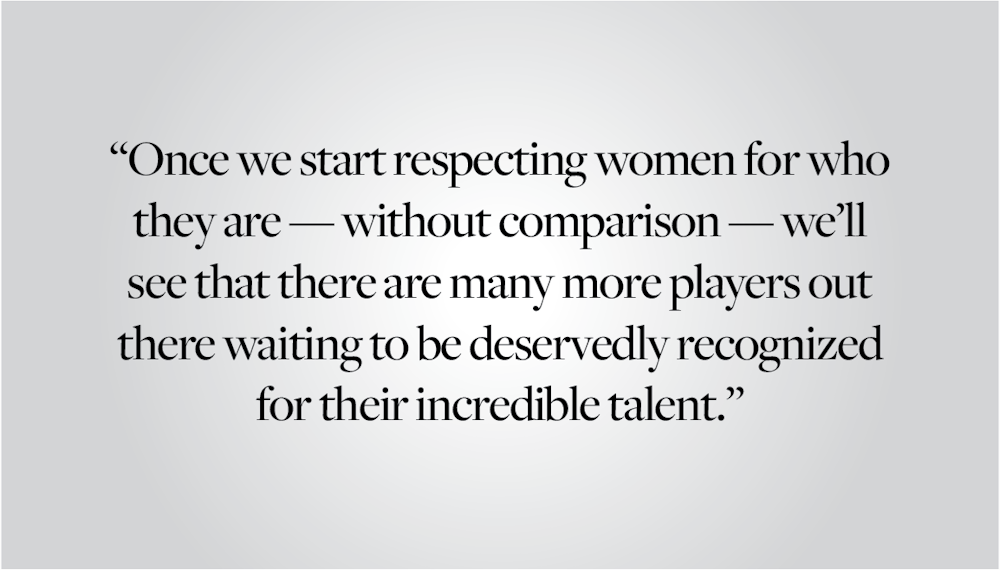Caitlin Clark’s meteoric rise to fame has captivated even those who typically avoid sports like the plague. The 22-year-old point guard for the University of Iowa became a household name leading up to the 2023 Women’s NCAA National Championship Game against the LSU Tigers which doubled viewership from the previous year’s final. Despite the Iowa Hawkeyes’ 102-82 loss, this game was only the start of Clark making headlines for women’s basketball. In the subsequent 2023-24 season, Clark broke records left and right, becoming the women’s NCAA Division I scoring leader, setting a major college scoring record, and claiming the record for the most career points of any Division I basketball player across male and female players — all in just 17 days. This year’s NCAA Women’s Basketball National Championship was the most watched women’s basketball game ever, and the most watched basketball game at any level since 2019.
While these positive changes should be applauded across the industry, some of the most popular women basketball players have had quite the opposite reaction. WNBA legend Sheryl Swoopes downplayed Clark’s achievements in a YouTube interview, claiming that the only reason Clark is breaking these records is because of the extra year of eligibility all college athletes were granted due to the COVID-19 pandemic. Swoopes painted Clark as a bully who is overpowering much younger girls in the league. Similarly, after Clark broke Lynette Woodard’s college scoring record, the former University of Kansas star said she did not consider her record to be actually broken, claiming that Clark had an unfair advantage due to her extended eligibility. It is worth noting that Clark isn’t even the oldest player on her team, and also broke the career goals record in less than four years.
It is thus surprising that women, who intimately understand how often their sport gets sidelined, would try to undermine the accomplishments of a fellow athlete, particularly one at the forefront of significant strides for representation.
I want to be clear that Clark is not the sole reason this past season of women’s college basketball was must-watch television. Players like Angel Reese, Paige Bueckers and JuJu Watkins have been major players in a star-studded season. While women’s college basketball has always counted on millions of fans and viewers, many believe that this new wave of media attention can be a turning point, not just for women’s college basketball, but for sports as a whole.
While Clark has become the face of college basketball, the role of race in this conversation is hard to ignore. With over 70% of WNBA players being Black, including Swoopes and Woodard, the impact of media bias in Clark’s rise to fame has been evident ever since the 2023 championship game between LSU and Iowa. Clarke and Reese, who is LSU’s star player and arguably the best forward in the league, went head to head in a passionate game, with LSU eventually coming out on top. In the aftermath, both players were accused of being arrogant, but the criticisms directed at Reese, a Black woman, were far more hateful and a lot less forgiving compared to Clark, who is white. Reese has since said that after that game, she has received death threats with accompanying racist remarks about her being too “hood” and “ghetto”. It’s also ironic that both of these women faced intense backlash on Twitter for being too cocky when celebrating their wins, but a men’s basketball legend like Michael Jordan hurls slurs at Muggsy Bogues, and his character or greatness is never questioned.
The lack of support for Black female basketball players is a serious issue in both the NCAA and the WNBA. But invalidating the generational talent of Clark does little to address the issue or shine a spotlight on the other women who play alongside her. On Monday, Clark was drafted to play for the WNBA’s Indiana Fever. The team has announced that networks will broadcast 36 out of 40 of their regular season games, a huge jump compared to the 22 they showed last season. Regardless of the reason for the increased publicity, Clark will be on the court with nine other women who will undoubtedly have more eyes on them than ever before. This increased visibility will allow more WNBA players to build their fanbases, or, at the very least, collectively inspire the next generation of women players to strive to new heights.
Unnecessary competition among women for dominance is unfortunately common and often caused by the belief that there is a limited number of spaces for women in important positions. Swoopes and Woodard may be understandably afraid that Clark’s seat at the table means that they will be pushed out of theirs and into obscurity. However, the only way to truly counter and overcome these dangerous beliefs is to actively work against them. While healthy rivalry drives the sport, tearing down women does not.
If the admiration for Clark can continue without some WNBA legends invalidating her accomplishments, then hopefully, more players can get their time in the spotlight. Women shouldn’t feel like they have to compete for the few spots society deems appropriate for exceptional female athletes. They should be able to thrive in the world of sports, free from comparison to their male counterparts. Once we start respecting women for who they are — without comparison — we’ll see that there are many more players out there waiting to be deservedly recognized for their incredible talent.





